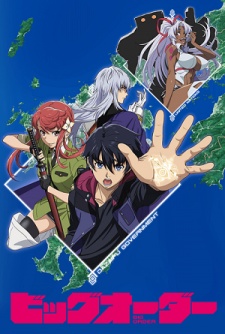
For some works, even one or two balls in the air is too many. The ten-episode {Big Order} starts out with a methodical pace, moving in a forward direction but clearly focusing on building its post-apocalyptic world, and introducing a cast of the superhumans known as Orders, their power stemming from their desperate wishes made as the world crumbled around them ten years ago. And yet even with the major players being incredibly straight-forward and typecast into their roles, it is only as the end closes in that Big Order realizes it may not have time to wrap everything up.
And really, maybe conquering the world in ten episodes was a bit too steep. But for the young protagonist Eiji, whose quiet life with his sick younger sister Sena is shattered as he is exposed to the whole world as the source of the Great Destruction that rended the world asunder ten years prior, dominating the world is all that he can see for the sake of curing Sena. Guided by a council of ten experienced Orders in charge of the Southern province of Dazaifu, Eiji uses his power of bending others to his will to slowly sweep through the nation, searching for Orders that may contain the key to his sister’s treatment.
There are some technical stipulations such as Eiji’s power only working on people standing where he has previously walked—an interesting restriction that makes little sense and is casually tossed aside in the later episodes—and various factions at play that serve to turn even the precious few middle episodes into borderline filler. Eventually Eiji’s deadbeat dad comes back on the scene, and suddenly Big Order has its get-out-of-jail-free card to renege on the promise of conquering the world piece by piece. Throwing around cryptic imagery and making up a convoluted story of the origins of Orders and the Great Destruction makes up the last few episodes of the show, right up until the point they can pull it all into one last climax and resolve everything in one fell swoop, the rest of the show be damned.
What were we supposed to be paying any attention to? Eiji’s life goes from being a careful game of political chess while surrounded on all sides to playing God and womanizing three people on the side, one of whom is his sister who he shares an unnecessary and slightly uncomfortable sex scene with. After hearing that the source material never included that scene, I assumed the animators had thrown it in for fan service as a one-off shot and left it for dead, but at the eleventh hour as the slicing and the pseudo-scientific mumbo jumbo reaches its peak, they double down and include at least two flashbacks to the same event. Technically they aren’t blood related and met around the time biology says they should be able to have sexual interest in each other at the very least, but with the way they talk as siblings it does feel awkward to have them use the same sort of dialogue in a sexual encounter. Plus the other sex scene with Eiji involves him being handcuffed to a hospital bed and sexually assaulted, so maybe it just feels somewhat wrong to get too invested in his life as a Casanova.
Meanwhile the rest of the cast, who fall to the backdrop one by one as the plot actually kicks into gear, all bring their single-minded grudges and hangups from ten years ago manifested as their Order powers, meaning that with one quick look at their abilities and a few lines from their mouths we know exactly what kind of character they are, what kind of backstory they have, and how they will eventually be curbed to Eiji’s will (both through his power of domination and his power as the “charismatic” lead of the show). There are some glimmers of moral quandary being posed as the climax approaches, with Eiji, his father, and his sister all being locked in a debate as to the value of a world where all wishes are granted, or where the blame lies for the Great Destruction. Emphasis on posed: in a mad dash to the finish line, the final episode blows past all these questions with Eiji’s side being randomly chosen as vacuously correct, and Eiji himself being absolved for all wrongdoings just to justify it all.
Another cour and they could have had his father succeed; I’d be interested to see what kind of world the original creator Esuno Sakae would have envisioned. He also wrote the dark thriller Mirai Nikki, continuing his obsession with wishes and a crumbling violent world here, but it almost seems painfully clear that he decided to see how much Mirai Nikki he could sneak into this work along that same vein. The ending to Big Order feels just as incomprehensible as in his previous work, and yet having only reached the climax by changing direction at the last minute there is none of the feeling that Mirai Nikki had in making it all seem inevitable, a necessary resolution as the central goal from the outset came to a close.
Even worse, Big Order commits the irreconcilable sin of resolving everything by just removing the limit on Eiji's power, solving all conflicts in a split second where he could have done so a whole ten episodes prior. He makes a bland wish to an already-present deity using the exact words that he has been spouting off since his very first appearance on screen, although thank god he did it after half the cast is shot throughout the show. Following the balls in the air analogy, it feels as if Big Order hurled the plot up right at the beginning and then proceeded to juggle the few balls left and clumsily drop them all one by one, only for the plot to finish its sluggish trajectory and hit us viewers squarely on top of the head.